You only have one more chance to get a good grade on IELTS Writing Task 2: write a strong ending. You’ll get a lower grade because a lot of other students either repeat the opening or stop too soon.
This article will teach you the following:
- Why the end is important for writing on the IELTS
- What a Band 8+ finish has
- A simple plan to follow
- A good example of a conclusion
- Things you shouldn’t do
- Real-life writings with a Band 9 grade
Why It’s Important to Do What You Set Out to Do
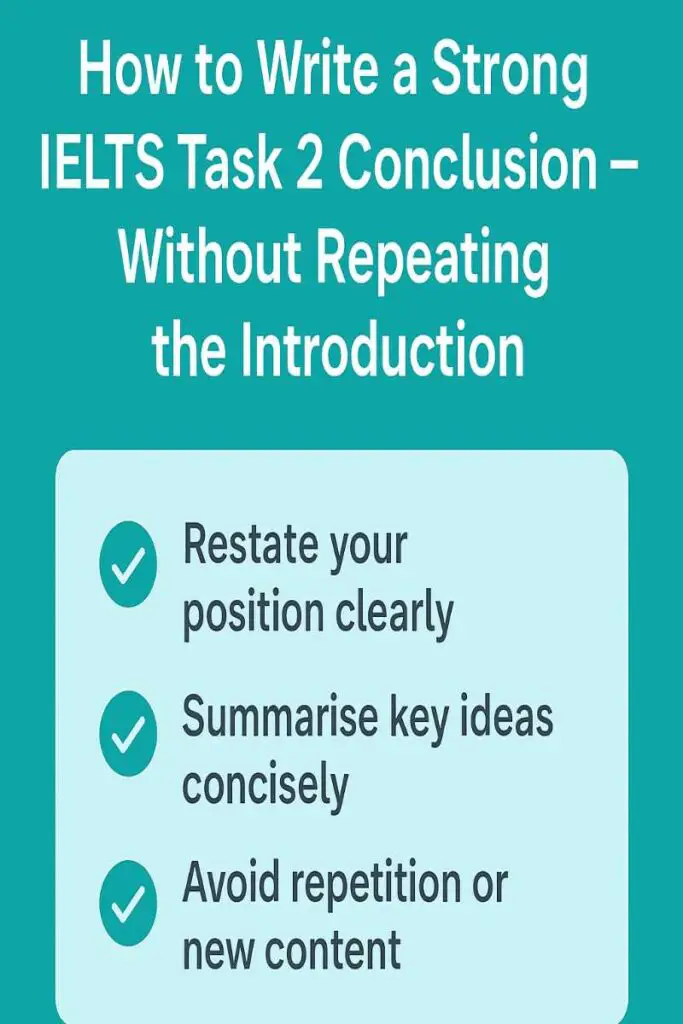
The finish affects two important band scores on the IELTS Writing test:
- Task Response: Have you given all of your ideas some thought and made sure they make sense?
- Consistency and Flow: Does the last part of your work make sense and flow well?
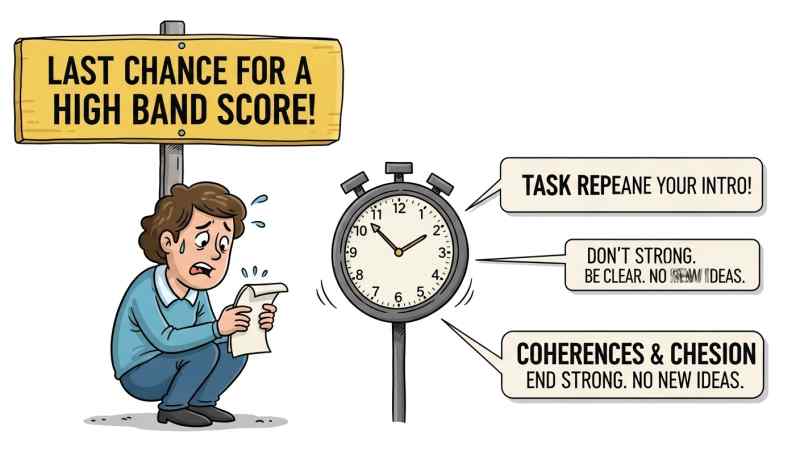
A strong conclusion:
- Makes your point clear once more
- Explains your main points in a few words
- Gives a sense of completion
- Does not present new ideas
Note: Your statement doesn’t have to be dramatic or impressive—just be clear and to the point.
Task 2 of the IELTS Writing Test: How to Write the Best Conclusion
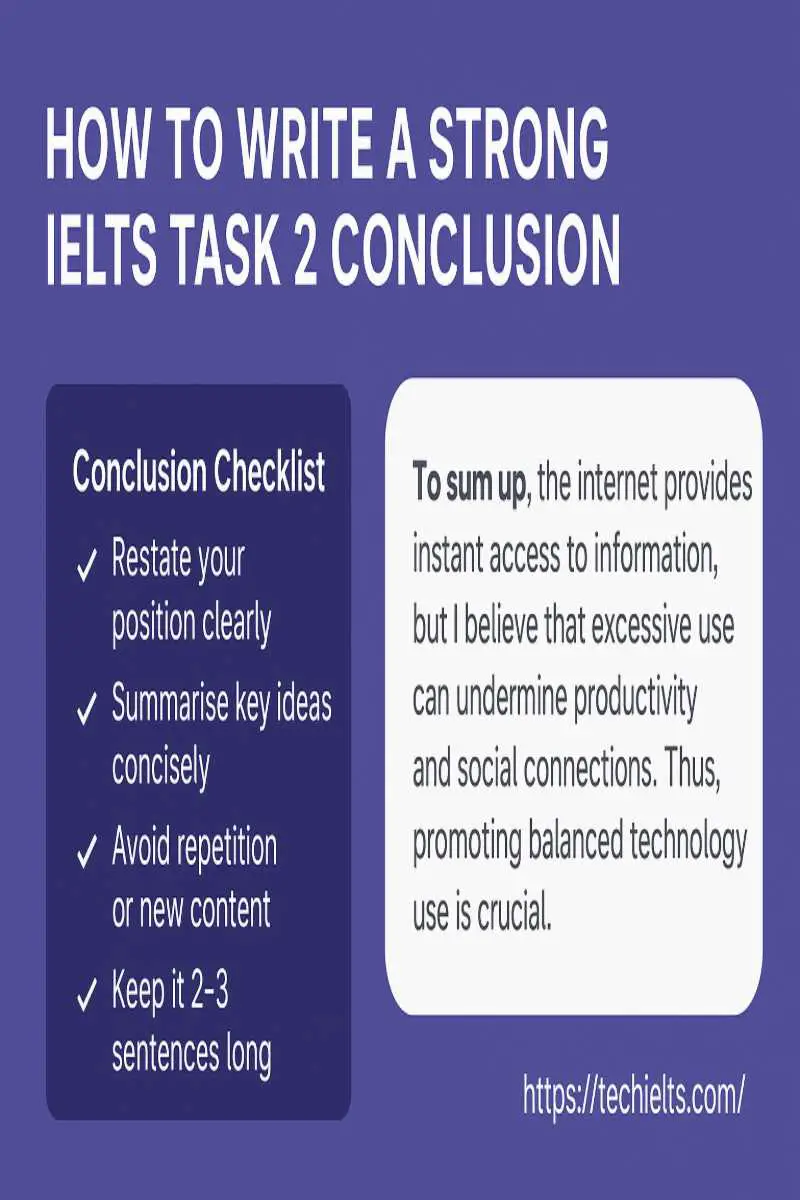
The ending should have two lines, but not more than three:
| Sentence | Goal |
| Sentence 1 | Restate your answer or opinion in your own words |
| Sentence 2 | Either repeat your main points or give one last thought |
| Sentence 3 | Suggest a result or piece of advice (but only if it’s suitable) |
Introduction Templates: How to Write a High-Scoring IELTS Task 2 Introduction – Structure and Templates
Essay Structures: IELTS Writing Task 2 Structure – How to Organize Your Essay for Band 8+
Example of an Opinion Essay Question:
Some people believe that towns should ban cars from the centre to protect the environment. How much do you agree or disagree?
Band 8+ Sample Conclusion:
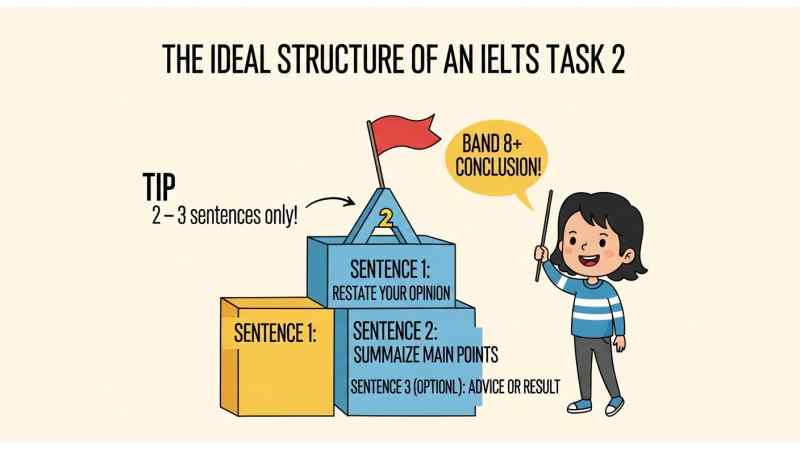
I agree that closing down roads for cars might help clean up towns, but I believe that public education and investments in eco-friendly transportation are better long-term solutions. This method addresses environmental issues without making it harder to move around in cities.
Examples of Sentences for Task 2: The End
1. Opinion Paper (Agree or Disagree)
- Finally, I strongly believe that [your opinion] because [short reason], even though some people think otherwise.
- I clearly agree or disagree with [topic] because the pros clearly outweigh the cons.
2. Discussion Essay (Talk About Both Points of View and Your Own Opinion)
- Both points of view are valid in the end, but I agree with yours because it leads to a better answer.
- To sum up, [view A] makes sense, but [view B] is what I personally believe for [short reason].
3. Problem–Solution Essay
- In the end, [trouble] needs to be fixed right away. People and governments can lessen its negative effects by putting [solutions] into place.
4. Advantages and Disadvantages Essay
- To sum up, the downsides of [topic] mean that this trend needs to be treated with care, even though [advantage].
5. Two-Question Paper
- Finally, [short answer to question 1] and [short answer to question 2]. These points of view show how complicated [topic] is.
Mistakes People Make When Writing Conclusions (and How to Fix Them)
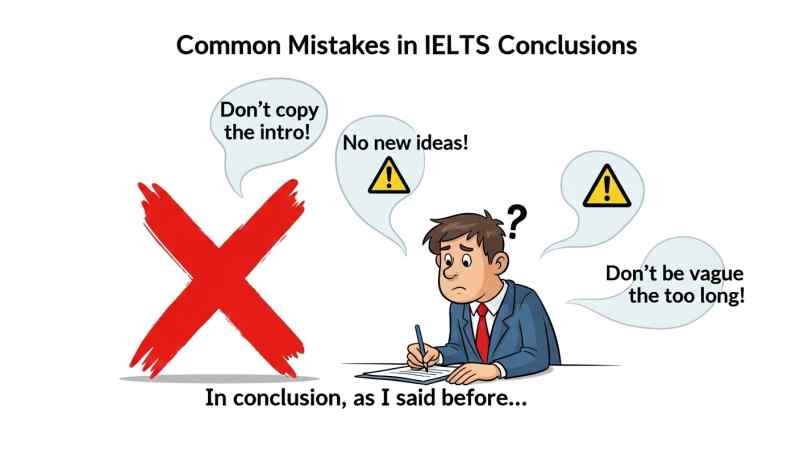
| Mistake | Why It’s a Problem | Fix |
| Copying the beginning | Reduces creativity and task performance | Change your thesis and use fresh wording |
| Adding new ideas | Confuses the reviewer | Only include new ideas in the body, not the conclusion |
| Too short (one vague line) | Feels incomplete | Add a summarising statement or clearly restate your opinion |
| Too long | Becomes repetitive and wastes time | Keep it to two or three clear lines |
Look at What Band 6 and Band 8 Say About the Subject
Band 6:
To sum up, there are good and bad things about the internet. That’s why individuals have various thoughts about it.
Band 8:
To sum up, the internet gives us instant access to information, but I think that using it too much can hurt our ability to work and connect with others. So, teaching people how to use technology in a balanced way is very important.
Examples of How to End Different Kinds of Essays
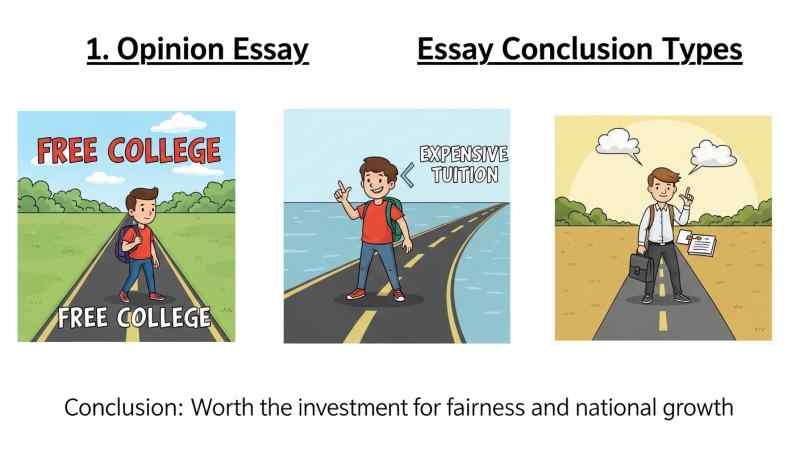
Opinion Essay Example
Question: There are people who think college should be free. Do you agree?
Conclusion: Free college may put a strain on government budgets, but I think it’s worth it for fairness’ sake and for the sake of national growth.
Discussion Essay Example
Question: Some people like working from home, while others like being in an office.
Conclusion: To sum up, I think that working from home gives you more freedom and a better work-life balance in today’s digital world, while working in an office encourages teamwork and discipline.
Problem–Solution Essay Example
Question: Many towns have a lot of trouble with traffic. What caused it and how can it be fixed?
Conclusion: In conclusion, traffic jams are mostly caused by too many people and bad facilities. Cities can fix this problem by putting money into public transport and encouraging people to share rides.
Advantages and Disadvantages Essay Example
Question: More and more people are learning online. What are the good and bad points?
Conclusion: To sum up, online education gives people all over the world access to tools, but it doesn’t allow for face-to-face communication. A mixed method might be the best of both worlds.
Two-Question Essay Example
Question: Some people like reading news online, while others like reading newspapers. Why does this happen? What do you think?
Conclusion: In conclusion, people like digital news because it’s quick and easy, but they still value newspapers because they are reliable. I think both formats are useful, depending on what the user wants.
Ideas for Phrases and Words That Go Instead of “In Conclusion”
| Phrase | Use |
| In short | Slightly informal; fine for balanced writing |
| Finally | Common and simple to use |
| Briefly | Helps summarise broad ideas |
| Thought to be | Good for opinion or analytical essays |
| Overall | Useful for advantage/disadvantage questions |
Reminder: Don’t use more than one concluding phrase in a single sentence.
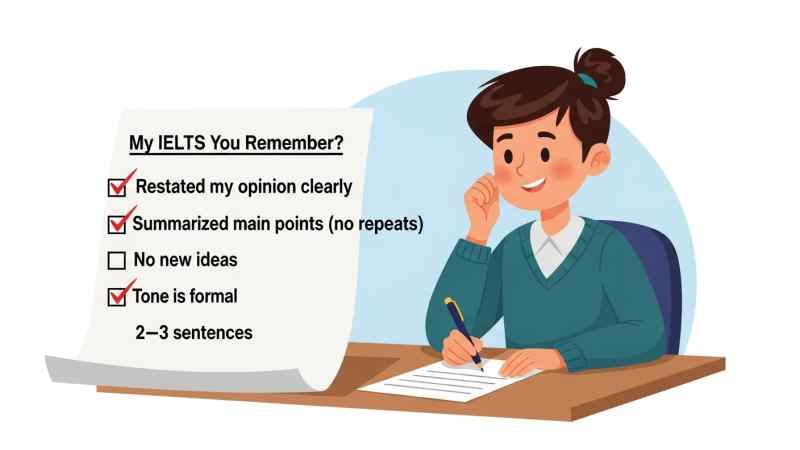
Practice Task
Question: Some people think schools should focus on academic subjects, while others think physical education is just as important. Discuss both points of view and give your opinion.
Task: Use one of the styles above to write a two-sentence conclusion. Submit it for feedback.
Before You End Your Essay, Make This List:
- Did I restate my point clearly?
- Did I summarise my main points without repeating everything?
- Did I avoid introducing new ideas?
- Is my tone formal and appropriate?
- Is my conclusion two to three lines long?
If yes, you’re ready to move on to the next Task 2 question.
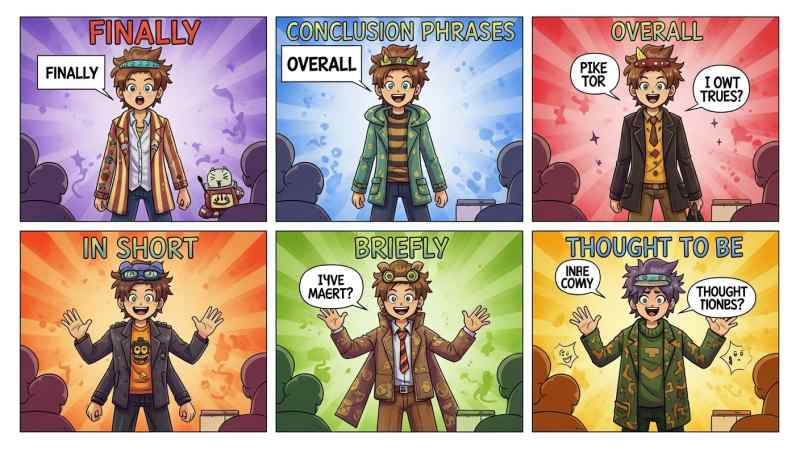
Last Thoughts
For IELTS Writing Task 2, the conclusion doesn’t have to be long or complicated, but it must be:
- Clear in restating your position
- Concise in summarising key ideas
- Free from repetition or new content
With consistent practice, proper structure, and formal language, you can write conclusions that strengthen your essay and improve your score.

About the AuthorWelcome to TechIELTS. I’m Md. Jahangir Alam, an experienced engineer with over 15 years in electrical and automation systems. Alongside my engineering career, I’ve developed a strong interest in English language learning and IELTS preparation.
I hold a Duolingo English Test score of 135 (IELTS 7.5 equivalent) and am currently pursuing an M.Sc. in Cyber Security from Royal Holloway, University of London. I use my technical background to create clear, structured IELTS learning materials for students and professionals.
👉 Connect on LinkedIn
